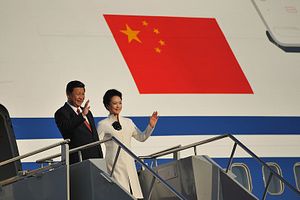The international focus on China’s recent Third Plenum illustrates two things: China’s influence in the world is growing, and the world’s interest in China has followed suit. As a result, more people than ever are following Chinese politics and issuing judgments on China’s leaders. Both at home and abroad, President Xi Jinping faces high expectations as he tries to solve China’s most intractable social, economic, and political issues. The outcome of the Third Plenum shows that Xi is aware of these expectations, and has accepted the herculean task of meeting them.
While, as my colleague Zach pointed out, the Third Plenum mostly grabbed low-hanging fruit, it’s still worth noting that Hu Jintao’s administration left this fruit on the branches. For example, China’s reformers have known for years that a change to the one-child policy is absolutely critical to China’s future. Despite this, Hu’s government was unable or unwilling to push through any actual changes. As with many political debates in China, reform was inhibited by powerful interest groups—many local governments make a substantial amount of money from fines levied upon violators of the one-child policy. Any reforms that could limit this income face steep opposition, which Xi’s government was able to overcome.
The creation of China’s new national security commission also represents a political breakthrough. Christopher Johnson, a senior adviser at the Center for Strategic and International Studies in Washington DC, noted that China’s previous two leaders, Hu Jintao and Jiang Zemin, both unsuccessfully pushed for a similar body. The formal announcement of the new commission, according to Johnson, shows that Xi “has tamed the most powerful elements in the party machinery, the military, and the intelligence and security services.” Xi has also demonstrated his political clout in his anti-corruption campaign. Rumors that Xi is investigating former security czar Zhou Yongkang suggest that Xi is not afraid to take on even the most powerful officials.
By contrast, Hu Jintao was not known as a political risk-taker. Despite gaining the title of general secretary to the Communist Party of China in 2002, Hu Jintao was unable to wrest control of the military from Jiang Zemin until 2004. Jiang remained an outsized influence in his successor’s government during Hu’s entire term in office. Accordingly, the results of the 2003 Third Plenum under Hu disappointed many. The most important outcome was the official acknowledgement of Hu’s signature political slogan, the “scientific development concept.” Ten years later, however, the term remains ill-defined—a symbol of Hu’s incomplete legacy.
Hu Jintao and his number two, Premier Wen Jiabao, were hailed initially as potential reformers. They faced many of the same expectations now laid on Xi Jinping. Despite repeated promises to address China’s structural imbalances, especially the widening income gap, Hu’s government achieved little in the way of real reform. As a result, some policy analysts have begun to call the Hu-Wen years a “lost decade.”
Xi Jinping seems determined to avoid this fate. In his explanation of the Third Plenum’s report, Xi noted that each Third Plenum is an important basis for judging the policies and focus of the new leadership. The Third Plenum’s report, he explained, is the key to accomplishing the leadership’s goals over the next five or even 10 years. There is a definite sense of legacy-building in these remarks—a rather strange idea, considering that Xi has only completed one year of what should be a 10 year term in office. Perhaps talk of Hu’s “lost decade” has inspired Xi to avoid a similar historical judgment.
Xi is aware of the oversized expectations China and the world have for his leadership team. Even at this early stage, he seems focused on avoiding the political deadlock that doomed most of Hu’s ambitions for reform. Instead of waiting until 2017, when he will have the chance to replace five members of China’s powerful Politburo Standing Committee with his own allies, Xi has already pushed ahead with a meaningful (though limited) package of reform.
Lest we forget, however, the People’s Daily also hailed the 2003 Third Plenum as “a big, historic stride.” Xi may be concerned about his legacy, but he has a long way to go before he can cement it. The changes announced at the Third Plenum may get diluted during the implementation phase. The changes to the one-child policy will be left largely to provincial authorities, who might delay or stonewall the changes entirely. Further, there are still questions over the government’s ability to implement more serious economic reforms, especially those concerning state-owned enterprises (SOEs). Still, the fact that Xi seems aware of his future legacy as well as the global and domestic scrutiny he faces is an encouraging sign.
Shannon Tiezzi is Associate Editor of The Diplomat.
































